Vegetarianism: A growing trend for environmental protection and healthier lifestyle
Vegetarianism is a kind of diet culture. People practicing it are called vegetarians, who avoid food products of animal origin, including animal oil and animal glue. The quietly spreading vegetarian culture has made vegetarian food more and more a global fashionable label. According to a survey, the UK has up to 7% of the population adhering to vegetarianism, and the Netherlands, Germany and France respectively have 4.4%, 1.25% and 0.9% of vegetarian population; while the prevalence of vegetarianism in some areas of Italy has reached 10% to 18%.
Vegetarians believe that besides obtaining natural, pure and balanced nutrition, they can also experience the joy of escaping from the hustle and bustle of city life and getting rid of desire. Another argument is that the resources consumed to provide a meal for one meat eater can satisfy twenty vegetarians for one meal. Many people now find that the benefits of adhering to a vegetarian diet include not only improvement of health, but also the implication on environment protection. Vegetarianism has represented a new environmentally friendly and healthy lifestyle.
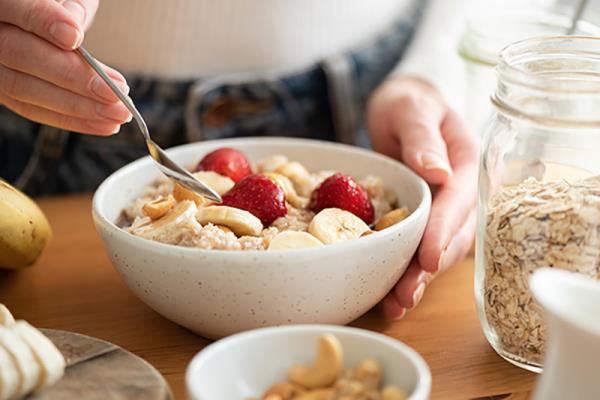
Growing acceptance of veganism leading to new health issues
Nevertheless, it must be pointed out that the popularity of vegetarianism also brings some health risks. Compared to meat eaters, vegetarians are more likely to suffer deficiency in protein, calcium, iron, zinc, and vitamins (especially vitamin B12, which is found almost exclusively in animal foods. B12 deficiency causes mental disorders). Vegetarians will say that all of the above nutrients can be got by having other vegetarian alternatives, even vitamin B12, which can be synthesized by certain bacteria. However, although nutrients such as protein, calcium and iron can also be obtained from plants, the absorption rate of such nutrients from plants is much lower than that from animal foods, which means that it is more difficult for vegetarians to intake these nutrients.
Obviously, most of the diseases caused by vegetarian diet are due to non-varied dietary intake and undernutrition as a result of inadequate protein, minerals, and vitamins. Imagine that a person survives by only eating a single food, but he/she may not be healthy. Medical research on vegetarian food has confirmed that vegetarians tend to have insufficient intake of vitamin A and vitamin E, the lack of which causes gallbladder epithelial cells to slough off, leading to development of cholesterol deposits and potential formation of gallstones. Many studies have indicated that some of the nutrients needed by the human body are mostly found in plant foods, while others are found in animal foods. A reasonable omnivorous diet can conveniently and effectively achieve nutritional balance. It is possible for a vegan diet to offer a comprehensive and balanced nutrition, but far more difficult [1].
Vegetarians requiring a variety of foods properly paired
Compared to meat eaters, vegetarians must consume a variety of foods in order to have a complete nutrition, which however is unrealizable for most people. Therefore, vegetarians have a higher risk of nutritional deficiency than meat eaters, primarily because of relatively narrow channels to obtain vitamins and minerals and the non-varied dietary patterns. The best way is to combine nutrients from different sources, especially protein, to achieve complementation.
The sources and supplements of protein for vegetarians are mainly plant-based. Regarding plant-based protein, the health and wellness industry has also launched a "plant-based" revolution in recent years, which is in close tie with vegetarian culture. According to data from the US market research and consulting agency Markets and Markets, "the innovation and development of plant protein leads to increasing shifts to vegetarianism, which in turn expands the market for plant protein." The global plant protein market is expected to grow from $10.3 billion in 2020 to $14.5 billion in 2025, a CAGR of 7.1%[2]. It is expected that the global plant-based market will reach a value of $40.6 billion by 2025.
Besides plant-based high-protein sources, microbial-derived proteins, which are from microbial-derived high-protein foods that are compatible with the the components of a vegetarian diet, are showing promise and increasing sharply.

The global demand for protein is rising rapidly, which is one of the main nutrients. With the increase of the population and the boosting of living standards, the demand for protein is growing at a fast rate. It is estimated that the world population is projected to rise to 9.7 billion by 2050, of which two-thirds are projected to live in urban areas [3]. The growth of the population combined with the rapid changes in eating habits has created a substantial "protein gap" between the protein available and the expected demand in 2050. The global per capita and annual demands for plant protein and animal protein have been increasing significantly from the 1960s to the 2030s [4].
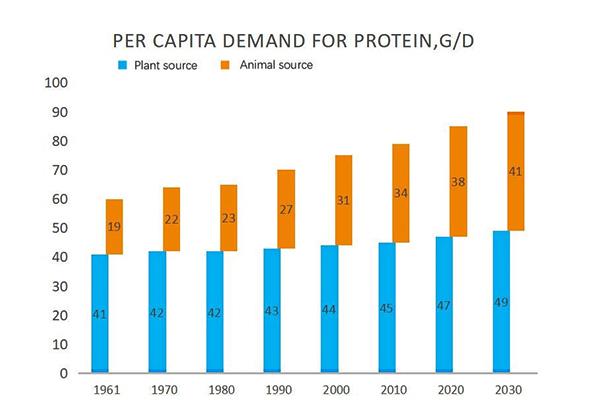
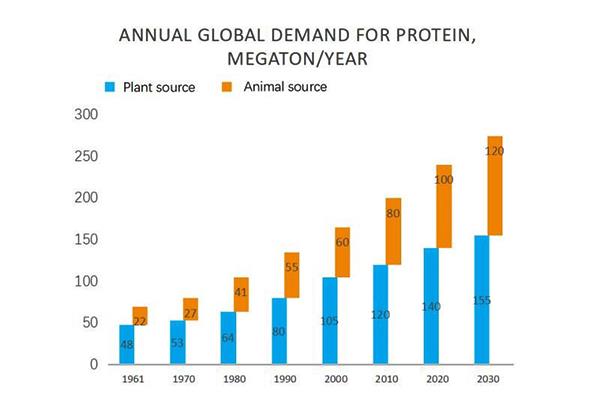
Yeast protein, a nutritional supplement more suitable for vegetarians
Due to various reasons, such as concerns about antibiotic residues and infections caused by bacteria, animal compassion, and environmental sustainability, consumers are increasingly reducing their meat and other animal products consumption. More and more people claim to be vegetarians or dieters, and they look beyond animal protein for alternative protein to meet their nutritional needs.
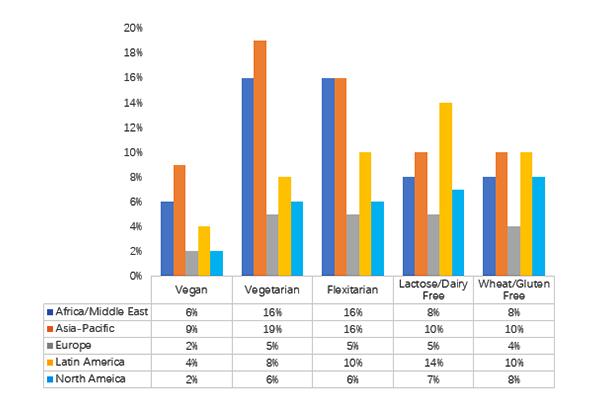
Percentage of special diets that follow restrictions or restrictions on specific foods or ingredients [5]
Currently, the main alternatives to animal proteins are plant proteins, such as those from wheat, soybeans, peas, etc. However, there is a global shortage of land for supplying plant protein, and at the same time the land resources also suffer degradation including land destruction, soil erosion, salinization, desertification, and pollution. Plant protein faces some unfavorable factors, such as yield and price instability due to the impact of climate and environment, and GMO risk, heavy metals and pesticide residues that are of concern. Therefore, the food, beverage and nutrition industries are confronted with a huge challenge, namely, how to find a solution to meet the protein needs of nearly 10 billion people in a sustainable and healthy way? We need to identify a reliable, sustainable and eco-friendly source of high-quality protein.
The AnPro yeast protein produced by Angel Yeast Co., Ltd. contains more than 70% of high-quality protein and it is extracted from primary-cultured Saccharomyces cerevisiae. The PDCAAS* and EAAI (Essential Amino Acid Index) of AnPro is in the same level as WPC (whey protein concentrate), higher than SPI (soy protein isolate), indicating that AnPro is of excellent quality and high digestibility.

*PDCAAS: Protein Digestibility Corrected Amino Acids Score, is a method of evaluating the quality of a protein based on both the amino acid requirements of humans and their ability to digest it. The PDCAAS rating was adopted by the US FDA and the Food and Agricultural Organization of the United Nations/World Health Organization in 1993 as "the preferred best" method to determine protein quality.
In recent studies, it was found that AnPro yeast protein contains a large quantity of branched-chain amino acids (BCAAs), including all essential amino acids and that the yeast protein contains 22.3% BCAA. The primary yeast protein derived from microorganism complements with plant-derived protein, fully making up for the insufficient lysine and threonine in plant protein. The amino acid content is as high as 156.14 mg/g protein, and the threonine content is up to 112.95 mg/g protein. The yeast protein not only accords with the vegetarian diet, with high protein efficiency ratio (PER) and being awarded with a protein score of 97, but also continuously and steadily increases satiety and provides amino acids, as it is rich in protein, dietary fiber and minerals, low in fat, and agrees with the diet preferences for vegans and vegetarians, and flexitarians. Furthermore, it inhibits the beany note imparted by soy protein and pea protein, increases product hydrability, improves the dispersibility of protein powder in water, and enhances protein flavor and mouthfeel.
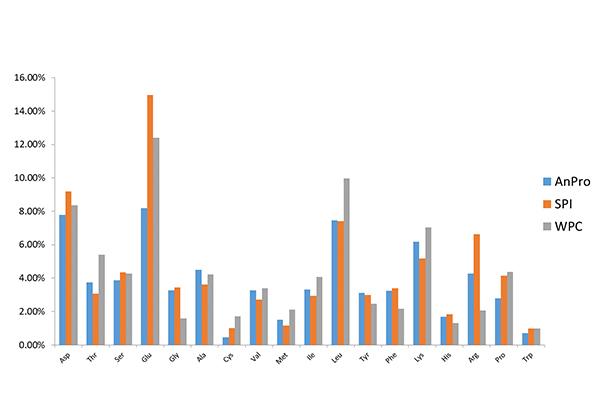
It takes 5.9 hectares of land to produce one ton of beef, 0.9 hectares to produce 1 ton of soybeans, and less than 0.1 hectares to produce one ton of yeast. The carbon emitted in fresh yeast production is only one-twentieth of beef production and one-fifth of pork production. For this, the yeast protein conforms to the concept of environmental protection and sustainable development, and it represents a source of high-quality protein and the best choice for vegetarians.
References:
【1】Would you like to go vegetarian? Sina. 2013
【2】Plant-based Protein Market by Source(Soy, Wheat, and Pea),Type (Isolates, Concentrates, and Textured),Form(Dry and Liquid),Application(Food and Feed),and Region(North America, Europe, APAC, South America, RoW)- Global Forecast to 2025,Markets and Markets.
【3】United nations, populations division.
【4】BIPE based on data from FAO.
【5】Nielsen’s Global Health and Ingredient-Sentiment Survey in the first quarter of 2016